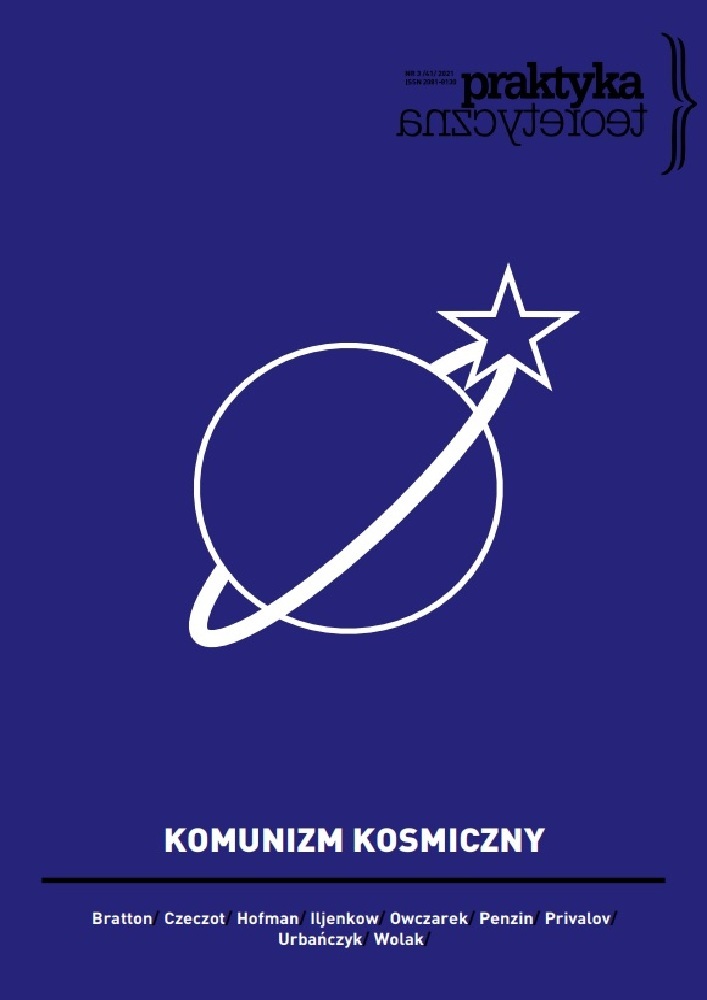Abstract
The article discusses Ada Palmer’s Terra Ignota series, which problematizes the liberal nature of contemporary utopias. The fictional 25th century, in which gender, nation states and the traditional understanding of the family–but not inequalities–have been abolished, is contrasted with the ideals a small percentage of the population. While the fictional reality is treated as a utopia by the majority of characters, the Utopians strive for a radical rupture from the contingency and pledge themselves to the unknown future. Since the states in Palmer’s world lack territory and it is impossible for Utopia to form an enclave on Earth, the Hive dedicates itself to terraforming Mars, with leaving Earth as their one common goal. The tasks the Utopians undertake are not rooted in a coherent homogenous project but seem to be grounded in a protest against the status quo naturalized by the rest of society. The Utopian strategy is treated as an example of China Miéville’s apophatic Marxism. Apophasis remains a powerful tool of critique and an incentive to take action.
References
Badiou, Alain. 2001. „On Evil.” Wywiad przeprowadzony przez Cristopha Coxa i Molly Whalen. Cabinet, Winter 2001–2002. https://www.cabinetmagazine.org/issues/5/cox_whalen_badiou.php.
Canavan, Gerry. 2018. Worlding Crisis, Crisising Worlds, wykład wygłoszony w trakcie konferencji Worlding SF na Uniwersytecie Karola i Franciszka w Grazu.
Esposito, Roberto. 2015. „Immunizacja i przemoc.” Tłum. Magdalena Wrana. W Pojęcia polityczne. Wspólnota, immunizacja, biopolityka. Wstęp Mateusz Burzyk. Tłum. zbiorowe. Kraków: Universitas.
Fisher, Mark. 2018. „Part Seven. Acid Communism.” W K-Punk: The Collected and Unpublished Writings of Mark Fisher, red. Darren Ambrose. Wstęp Simon Reynolds. London: Repeater. EPUB.
Fisher, Mark. 2020. Realizm kapitalistyczny. Czy nie ma alternatywy? Tłum. Anna Karalus. Warszawa: Książka i Prasa.
Frase, Peter. 2018. Cztery przyszłości. Wizje świata po kapitalizmie. Tłum. Maciej Szlinder. Warszawa: Wydawnictwo Naukowe PWN.
Freedman, Carl. 2009. „Dialectics of Science Fiction and Film Noir.” W Red Planets: Marxism and Science Fiction, red. Mark Bould i China Miéville. Middletown: Pluto Press.
Geoghegan, Vincent. 2008. Utopianism and Marxism. Bern: Peter Lang.
Jameson, Fredric. 2011a. Archeologie przyszłości. Pragnienie zwane utopią i inne fantazje naukowe. Tłum. Maciej Płaza, Małgorzata Frankiewicz i Andrzej Miszk. Kraków: Wydawnictwo Uniwersytetu Jagiellońskiego.
Jameson, Fredric. 2011b. Postmodernizm, czyli logika kulturowa późnego kapitalizmu. Tłum. Maciej Płaza. Kraków: Wydawnictwo Uniwersytetu Jagiellońskiego.
Foucault, Michel. 2000. „Czym jest Oświecenie?” W Filozofia, historia, polityka. Wybór pism. Tłum. Damian Leszczyński i Lotar Rasiński. Warszawa–Wrocław: Wydawnictwo Naukowe PWN.
Levitas, Ruth. 2013. Utopia as Method: The Imaginary Reconstitution of Society. Basingstoke: Palgrave Macmillan.
Miéville, China. 2019. „Silence In Debris: Towards an Apophatic Marxism.” Salvage, April 2, https://salvage.zone/in-print/silence-in-debris-towards-an-apophatic-marxism/.
Moylan, Thomas. 1986. Demand the Impossible: Science Fiction and the Utopian Imagination. London: Methuen.
Moylan, Thoma. 2000. Scraps of the Untainted Sky: Science Fiction, Utopia, Dystopia. Boulder–Oxford: Westview Press.
Otto, Rudolf. 1999. Świętość: elementy irracjonalne w pojęciu bóstwa i ich stosunek do elementów racjonalnych. Tłum. Bogdan Kupis. Warszawa: Wydawnictwo KR.
Palmer, Ada. 2019a. Siedem kapitulacji. Tłum. Michał Jakuszewski. Warszawa: MAG.
Palmer, Ada. 2019b. Do błyskawicy podobne. Tłum. Michał Jakuszewski. Warszawa: MAG.
Palmer, Ada. 2020. Zdecydowani na walkę. Tłum. Michał Jakuszewski. Warszawa: MAG.
Ryan, Marie-Laure. 2012. „Narration in Various Media.” The Living Handbook of Narratology, January 13, https://www.lhn.uni-hamburg.de/node/53.html.
Suvin, Darko. [1979] 2016. Metamorphoses of Science Fiction: On the Poetics and History of a Literary Genre. red. Gerry Canavan. Bern: Peter Lang.
Suvin, Darko. 1988. Positions and Presuppositions in Science Fiction. London: Palgrave Macmillan.
License
“Theoretical Practice” seeks to put into practice the idea of open access to knowledge and broadening the domain of the commons. It serves the development of science, thinking and critical reflection. The journal is published in open-access mode under the CC-BY-NC-SA 4.0 license (detail available here: http://creativecommons.org/licenses/by-nc-sa/4.0/). Articles published in the journal may be freely distributed, stored, printed and utilized for academic and teaching purposes without restrictions.
They should not be, however, used for any commercial purposes or be reconstructed into derivative creations. Access to the journal may not be limited or offered for a fee by any third party.
Prospective authors are obliged to fill in, sign and send back the publishing contract compliant with the CC licencing. [PL.pdf, PL.doc, EN.pdf,EN.doc].
According to this contract, authors grant the journal a non-exclusive right to publish their work under the creative commons license (CC-BY-NC-SA 4.0) without any financial obligation on both sides of the contract.
Before submission authors should make sure that derivative materials they use are not protected by copyright preventing their non-commercial publication. Authors are responsible for any respective copyright violations.
